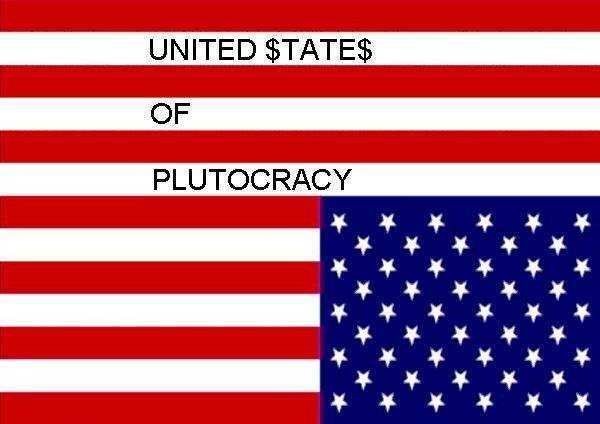Mainstream news coverage of the US Primaries reveals a standard pattern. Donald Trump and Bernie Sanders are positioned as maverick populists who are challenging their party establishments. And, there is, it seems, a disconnect between ordinary American voters and the machinations of Washington political elites.
This standard depiction is simplistic and deceptive.
The real disconnect is that between the voting public and corporate America.
The Republican Party establishment has been colonised by the Koch brothers; a multibillionaire duo militantly opposed to unions, public health, benefit provision, progressive income tax and the redress of economic inequalities. They are uneasy about Tea Party populism (conservative war veterans want to retain their military pensions) and deeply opposed to Donald Trump. He acknowledges popular concerns about Americas economic sovereignty and is prepared to modify his message to win the Republican nomination.
What really irritates the Koch brothers is that Trump is independently wealthy; he runs his own campaign and cannot be bought.
Meanwhile Wall Street has colonised the Democratic Party establishment. Their favoured candidate, Hilary Clinton cannot escape the economic repercussions of her husband`s Presidency.
In 1999 Bill Clinton signed off the Gramm-Leach-Bliley Act, a financial deregulation package which effectively repealed the Glass- Steagall segment of the 1933 Banking act. This legislation , under Franklin Roosevelt legally separated the functions of commercial/retail banks from investment banks. The massive financial failure which followed the Wall street collapse exposed a fundamental flaw within US capitalism.
Too-big-to-fail banks were using huge everyday deposit money to finance all kinds of speculative activities in stocks and real estate. In sum, cheque, savings and insurance accounts plus residential and commercial mortages were beholden to the greed and recklessness of Wall Street. Roosevelt`s response was part of a `New Deal` framework which positioned private banks alongside the Federal Reserve as facilitators of industrial production , infrastructural investment and commodity exchange.
This was the Democratic Party`s heritage until the repeal of Glass- Steagall under the Clinton Presidency (1993-2001). One year later the Commodity Futures Modernisation Act allowed investment banks and hedge funds to make speculative trades in financial derivatives without transparency or regulatory oversight. This open gift to Wall Street was endorsed by Alan Greenspan at the Federal Reserve, Arthur Levitt at the Securities Exchange Commission plus Larry Summers and Robert Rubin in Bill Clinton`s Treasury Department.
By this time investment banks had moved well beyond lending, funds management and trading on behalf of clients. They undertook proprietary trading in financial and other assets while lending to other bodies for their trading activities (eg financially engineered corporations, hedge funds, private equity groups and various private investment vehicles). Globally, the largest banks borrowed billions to mobilise hedge funds. The standard procedure was to enter a particular market to generate a price bubble, reap huge speculative profits, withdraw and burst the bubble, then enter a new market.
This sequence accounts for the crucial role of investment banks in the 1990s currency bubbles (in the UK, Russia, Mexico and South East Asian economies ), and the late 1990s dot.com boom.
Throughout the early 2000s investment banks themselves became trapped in a massive bubble driven by the securitisation of household debt, the spread of mortage derivatives and the global connectivity of these developments. The resulting financial collapse has been vividly explained in documentary and film (ie Inside Job, Margin Call, 99 Homes and the Big Short). My point here is that the Clinton Presidency`s eschewal of financial regulation contributed to the disaster.
President Obama`s response was ineffective.
In September 2008 after the fall of Lehman Brothers massive government intervention was required to stabilise the financial system. The key question was, what form should such intervention take?
Two major options were available.
With the `takeover` option, the government assumes ownership of failing institutions in order to delete toxic assets and restructure banking operations in accordance with the principles of transparency and prudential asset management. Old financial managers lose their jobs, shareholders are wiped out and remaining losses are carried by creditors and taxpayers. Certain banks will be closed; those that are restored to profitability may be kept or returned to the private sector. The new purpose of banking is to provide credit for businesses and infrastructural projects, with the assistance of fiscal stimulus packages. Elected governments rather than financial interests set the path of macroeconomic policy. This aligns with Franklin Roosevelt`s `New Deal` policy agenda in the 1930s.
The `blank cheque` option compels the government to provide money for surviving financial institutions; systemic collapse is prevented by investing new capital, overpaying for bank assets and insuring these assets at below market rates. Banks are kept afloat in their existing form, managers lose their jobs, shareholders retain some of their stake and creditors receive some protection. In effect, the government`s blank cheque to the banking sector is paid for by the taxpayer. Yet, if certain banks recover , the benefits are confined to managers, shareholders and major creditors.
In this scenario banks return to their earlier speculative practices.
As we now know, Obama chose the `blank cheque` option. He supported the Troubled Asset Relief Program (TARP) whereby surviving banks received a blanket government guarantee for the insurance of bonds and debt instruments. Over the first 12 months of Obama`s Presidency taxpayer funded bank bailouts exceeded US $12 trillion. As the largest banks returned to profitability and resumed speculative practices, second tier banks could not obtain liquidity.
Farmers, manufacturers, construction firms, retailers and start-up businesses could not get bank loans. In short Wall Street recovered at the expense of Main Street. Obama`s Financial Reform Act of 2010 did not re-separate investment and commercial banks and placed no limit on the overall size of banking conglomerates. Thus, Wall Street prevailed even though they were often vilified by ordinary Americans and sometimes criticised by congressional representatives.
Against this historical background the potency of Bernie Sanders` campaign is clear. He is the only Presidential hopeful with the courage to take on Wall Street. By so doing he becomes the newly found conscience of the Democratic Party just as Hilary`s authority on economic matters is compromised by Bill`s record in office.
Sanders` stance on financial regulation can be briefly summarised. Reinstate Glass-Steagall or its equivalent, break up the big banks, introduce a financial speculation tax and stop systematic tax evasion. In his view the influence of Wall Street and non-financial corporations worsens economic inequality, job security, health provision and access to education.
Sanders has made his case with great rhetorical skill; a recent tweet declares that `if the Fed could bail out Wall Street with extremely low interest rates,we can treat graduating students with the same respect`.
This will not be an easy fight.
In Washington the finance lobby is more powerful than big Oil, big Pharma and Hollywood. In the Federal Reserve senior positions are occupied by alumini from Goldman Sachs and other major investment banks. And, Hilary Clinton, like her husband, is not going to upset these people.
In my view, however, Bernie has a few things in his favour. His attacks on Wall Street and corporate elites resonates with popular resentment against `the 1 percent`. Occupy has left the scene but some of its spirit remains. Recent turmoil in financial markets and sharemarkets worldwide, indirectly favours Sanders` campaign. In a recent Guardian Weekly piece Larry Elliot remarked that `February 2016 is starting to smell suspiciously like early September 2008 and the days before the collapse of Lehman Brothers` (`Market mired in past errors` 19-25 February).
As the general situation worsens it will become obvious that no other candidate has a response plan on behalf of the American people. When this happens the truth of Bernie Sanders` campaign will become obvious , whether or not he wins the Democratic Party nomination.







Nice article Wayne. Bernie wears a White Hat – the first to do so openly in some time. He also knows about N.E.S.A.R.A. and from what I hear will enact it immediately once in office (but maybe be beaten to it by Dunsford). The Chinese and the Russians also favour Bernie and are doing their utmost to take down the Illuminati banksters and corporations (actually they’ve done this already – it’s just the death throes of the minions which is so ugly at the moment). Roll on the announcement of the Republic, roll-out of the new gold-backed U.S. Note and restitution of the true Constitution, I say.
I wonder what it will feel like once N.Z. becomes truly free and democratic. Really looking forward to that change. My money is on end 2016 beginning 2017.
“This was the Democratic Party`s heritage until the repeal of Glass- Steagall under the Clinton Presidency (1993-2001). One year later the Commodity Futures Modernisation Act allowed investment banks and hedge funds to make speculative trades in financial derivatives without transparency or regulatory oversight. This open gift to Wall Street was endorsed by Alan Greenspan at the Federal Reserve, Arthur Levitt at the Securities Exchange Commission plus Larry Summers and Robert Rubin in Bill Clinton`s Treasury Department.”
Yes, I remember the Clinton era, and how neoliberalism was embraced, also by supposedly “progressive” parties and governments in Europe and here. Reagan in the US and Thatcher in the UK brought in radical changes, that to this day have largely been irreversible, it seems. Clinton presented as a “moderate”, but really only continued the work of the neoliberal lobby groups (big business and finance). The way he ran “social services” was also something that we now have here in New Zealand, massive outsourcing and the state ridding itself off responsibilities.
This is another must read post by Wayne, and gives us a great insight of what went on, and what we face. Indeed it is Wall Street that has the most power in the US, even globally, and the finance and banking bosses will do all they can to stop Sanders from becoming president.
When we have guys like Trump now being dealt as likely contenders for the top job of president, and the MSM basically allowing him to get more traction, we know how corrupt the MSM are. In the end I fear that big money will flow to help Hilary Clinton into her job. The fact that she will have won with the financial support and permission of Wall Street will tie her hands re what she can do when running the US government.
We will have another light version of what her husband stood for, much big talk and little real action, rather action to save the status quo and otherwise empty symbolic gestures.
If the people do in large numbers fall for Trump, they will again fall for the manipulations of Wall Street, and thus I feel somewhat certain, that Bernie Sanders has already lost, not because of personal failures or ideas, but for the fact that all will be done to keep him out of the White House.
Trump is too much an enfant terrible for Wall Street, so they will make sure he does not get there. It will be Hilary, the first female president of the US, democracy is nothing but “demockeracy” in America, as it is also becoming here, a mockery of the poeple’s interests, needs and their informed will. It is just a massive farce, endless manipulations, and prepare for a fourth term JK, unless something major happens to disrupt the political landscape here soon. I am sorry to say this, but that is my take on it all.
Sadly I agree with you Mike.
Truth is definitely on Bernie’s side. That’s the problem. People don’t like the truth because it impinges on whatever it is they want, from amoral profit driven corporates down to your man or woman on the street who thinks it is their right to eat endangered whitebait species.
Truth is on Bernies side but the corporations are on Clintons side.
Fox news always says Clinton will win the nomination because they know, and are part of the system.
The people of America must be blind to the backing of Clinton,how would they vote for her otherwise?Most of the super delegates are on her side and they are the gang who are part of the power structure.
The corporation will make sure Clinton wins because she will do as shes told ,they dont hand over millions for no return.Bernie has a fight on his hands and its not a fair fight .
It is so massively disappointing to know that likely ( ? ) the US elections will be rigged to put their corporate queen Hillary in to continue the corporate rape of the world. More wars – more bank crimes and on and on. The corporate lobbies control the US govt. and they plan to win.
Bernie is the only healthy and sane choice and the — ” peoples ! ” — choice for all the obvious reasons yet we are afraid that it all may have already been set up and rigged to fall back into the Bush/Clinton criminal elite camp. Remember Florida. Sad and shameful. Democracy and the U.S. Constitution are dying.
Consider reading the new and very powerful book by Roger Stone exposing the criminal Bush Family ( and the Clintons as well ) : entitled – ” Jeb and the Bush Crime Family “.
http://www.tampabay.com/blogs/the-buzz-florida-politics/roger-stones-book-on-bush-crime-family-coming–soon/2260177
Comments are closed.